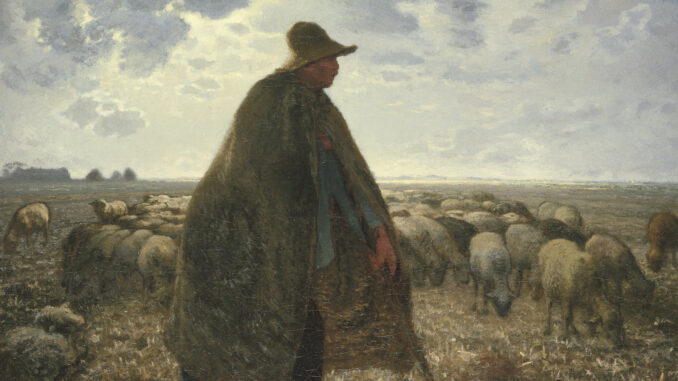
“The Lord is my shepherd; I shall not want. He maketh me to lie down in green pastures: he leadeth me beside the still waters. He restoreth my soul: he leadeth me in the paths of righteousness for his name’s sake. Yea, though I walk through the valley of the shadow of death, I will fear no evil: for thou art with me; thy rod and thy staff they comfort me. Thou preparest a table before me in the presence of mine enemies: thou anointest my head with oil; my cup runneth over. Surely goodness and mercy shall follow me all the days of my life: and I will dwell in the house of the Lord for ever.” Psalm 23:1-6
The Twenty-third Psalm is the most familiar passage in the Bible. It is the children’s Psalm, memorized first of all the Scriptures by countless numbers. It is the Psalm of the sick room, dear to the hearts of sufferers, because of the divine tenderness revealed in the words. It is the Psalm of the deathbed. Rarely does a Christian pass from earth, without repeating the words, “Even though I walk through the valley of the shadow of death, I will fear no evil, for you are with me; your rod and your staff, they comfort me.” It is the Psalm of old age.
The shepherd is a favorite Scriptural picture of the divine love and care. In the Old Testament, the twenty-third Psalm gathers the whole wonderful truth in exquisite lines, which are dear to young and old wherever the Bible is known. Then in the New Testament, when our Lord would give His friends the sweetest revealings of His heart toward them, and tell them what they are to Him and what He would be to them — He says, “I am the Good Shepherd.”
“The Lord is my SHEPHERD.” Shepherd seems a homely name for God, yet when we know the story of shepherd life in the East, it is a very fitting name. The shepherd lives with his sheep. He guards them by night. He defends them when they are in danger. He leads them out to find pasture. He takes the little lambs and the weary ones in his arms — and carries them. He seeks the lost or straying ones. He even gives his life in protecting them. When we know all this about the shepherd, we see how the name interprets God to us. Just so, Christ lives with His people. He enters into closest relations with them.
The shepherd knows his sheep. He has a name for each one and calls them all by their names. Just so, Christ knows each one of His friends, has intimate personal knowledge of each one. He knows the best in us — and also the worst — our faults, our sins, our wanderings. Yet, knowing us as we are — He loves us still and never wearies of us!
The shepherd is most gentle with his sheep. He does not drive them — but goes before them and leads them. When they need rest on the way — he makes them lie down, and chooses for their resting-place, not the dusty road — but green pastures. He is especially kind to the lambs, gathers them in his arms and carries them in his bosom. All this is an exquisite picture of the gentleness of our Good Shepherd in His care of His sheep. He is thoughtful toward the weak. He loves the lambs and makes room for them on His bosom. Whatever the need is, there is something in the heart of Christ which meets its craving and supplies its lack.
The shepherd defends his flock in all danger. Often, he had to risk his own safety, even his life, in protecting his sheep. Just so, the Good Shepherd gives His life — for His sheep.
“The Lord is MY shepherd.” It would not be the same to us if the words ran, “The Lord is A shepherd.” He might be a shepherd to a great many people, all that the rich word means, and yet not be anything comforting to me. But if I can say with joy, “The Lord is my shepherd,” I can sing the song through to the end.
“The Lord IS my shepherd.” The present tenses of the Bible are rich in their meanings. That is the way the promises and assurances of the Scriptures are written. “The Eternal God is your refuge” — not was. It might, then, have been true a year ago, yesterday — but not to be true now. There will never come a moment when you cannot say this. “Loved once” is never said of Christ. He loves unto the end.
Christ’s sheep are absolutely safe in His keeping. “I give unto them eternal life,” He said; “and they will never perish — ever. No one will snatch them out of My hand.” Then at last, He will bring His own all safely home, “and they shall become one flock — with one Shepherd.”
J.R. Miller (1840-1912) was a pastor and former editorial superintendent of the Presbyterian Board of Publication from 1880 to 1911. His works are now in the public domain.



